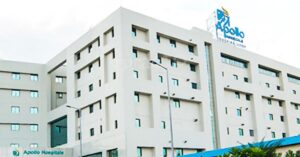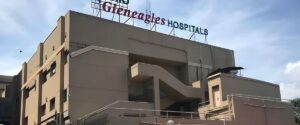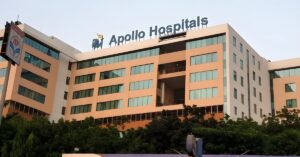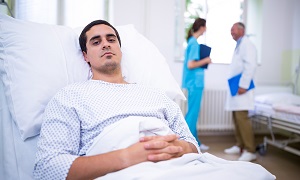Best Doctors in India for Bronchoscopy
Best Hospitals in India for Bronchoscopy
- City: Chennai, India
Hospital Highlights:
- Apollo Hospitals, Chennai, is one of the best hospitals for heart care in India. Over the years, Apollo has expanded all over India, as a healthcare chain.
- India’s first ‘Only Pancreas’ transplant was performed in Apollo Hospital. The hospital is known for successfully performing Asia’s first en-bloc combined heart and liver transplant, and over the years, it has attained a remarkable achievement in the global healthcare space. Around 3-4 organ transplants are performed in the hospital per day.
- Equipped with over 500 beds, this hospital in Chennai was established in 1983 and since then has been among the most preferred hospital for patients from all over the world.
- The hospital holds accreditation of the NABH and JCI and is the first hospital in India to be ISO 9001 and ISO 14001 certified. It is also the first South Indian Hospital to receive subsequent reaccreditation from the JCI USA 4 times.
- City: Chennai, India
Hospital Highlights:
- Established in 1999, Gleneagles Global Hospital, Chennai, is one of the top healthcare facilities in Southern India. It is part of the Gleneagles Hospital Chain, which is the fourth largest healthcare chain in the country. The hospital specializes in multi-organ transplants of kidneys, liver, lungs, heart, etc.
- The hospital has an excellent infrastructure and state-of-the-art lab and equipment set-up. The hospital boasts cutting-edge technologies, a highly skilled team of doctors and surgeons, and trained support staff. Located in Perumbakam, Chennai, it is one of India’s premier health care destinations. The hospital has performed some of the most complex surgical and clinical procedures in India including multi-organ transplantations.
- The hospital’s lung transplantation program is one of the best in the country. The hospital is known for having performed India’s first single lung transplant and first minimal invasive lung transplant. It is also the only Indian hospital to be associated with King’s College Hospital, London, United Kingdom for liver transplantations.
- City: Hyderabad, India
Hospital Highlights:
- KIMS Hospital (a brand name of Krishna Institute of Medical Sciences) is one of the largest and best multi-speciality hospitals in Hyderabad. The hospital provides various treatments to an enormous number of patients.
- The hospital has a capacity of more than 3000 beds. KIMS Hospitals offers different healthcare services in more than 25 specialities and super specialities.
- The hospital is equipped with modern medical equipment and technology. It has robotic equipment to provide minimal invasive techniques for patients.
- The hospital is aimed at providing world-class healthcare facilities and services at an affordable cost for patients.
- The various specialities and departments of the hospital include neurosciences, gastroenterology & hepatology, robotic science, reproductive sciences, dental science, oncological sciences, organ transplantation, heart and lung transplantation and mother and child care.
- City: Kolkata, India
Hospital Highlights:
- Established in 2003, Apollo Gleneagles Hospitals is a 750-bed multispecialty tertiary care hospital situated in Kolkata.
- With 33 Centres of Excellence and more than 50 specialties, Apollo Gleneagles Hospitals, Kolkata is capable of handling all sorts of patients.
- This tertiary care hospital, which is a 100% subsidiary of Apollo Hospitals Enterprise Ltd., India, is regarded as one of Kolkata’s top hospitals.
- The facility is a complete blend of cutting-edge technology, state-of-the-art infrastructure, and genuine hospitality.
- Focusing on numerous specialties, the hospital provides all-inclusive medical treatments supported by cutting-edge technology and a staff of highly qualified medical specialists.
- Patients across the globe come to Apollo Gleneagles Hospitals Kolkata for their treatment. Moreover, international patients receive full attention and assistance for their treatment and are provided with a hassle free experience.
- Apollo Gleneagles Hospitals, Kolkata is the only hospital in Eastern India to hold the Joint Commission International (JCI) certificate.
- It is also the only hospital in Kolkata to hold the NABL accreditation in six different categories, which includes Clinical Biochemistry, Clinical Pathology, Hematology & Immunohematology, Microbiology & Serology, and Histopathology & Cytopathology.
- Furthermore, Apollo Gleneagles Hospitals, Kolkata is known for performing the first ever Reverse Shoulder Prosthesis Replacement in East India.
- City: Bengaluru, India
Hospital Highlights:
- Established in 1991, Manipal Hospital, Old Airport Road, Bangalore is the flagship facility of the Manipal Hospitals Group, which is one of the largest networks of Multispecialty Private Hospitals in India.
- The facility is well-known for its state-of-the-art technology, performance-driven, patient-centric, and evidence-based approach.
- The facilities offered at Manipal Hospital meet the highest international standards, allowing the hospital to attract a large number of national and international patients.
- Their expertise encompasses the diagnosis and treatment of a wide range of diseases in several specializations that address both simple as well as complex medical procedures.
- There are total 600 beds accessible in the hospital for the in-patients so they may heal while being closely watched after by the medical team. In addition, it has 144 critical care units, including NICUs, ICCUs, and ICUs. Apart from that, the hospital also offers 20 contemporary, modular state-of-the-art operating rooms with all the amenities needed.
- The hospital has several departments that are overseen by highly skilled, certified, and experienced medical experts.
- One of the best departments in the hospital is that of the Cancer department which is known for its advanced cancer diagnosis and treatment facilities such as Intracavitary Chemotherapy, Biological Therapy, HIPEC, PIPEC, Nuclear Medicine, Radiation Therapy, etc.
- It is one of the few hospitals in Bangalore that provides full range of pediatric services, including pediatric emergency services, pediatric gastroenterology, pediatric neurology, pediatric cardiology, pediatric orthopaedics, pediatric allergies, pediatric immunology, and infectious diseases.
- Furthermore, Manipal Hospital, Old Airport Road, Bangalore is also regarded as one of the best hospitals for bone and spine related disorders.
- City: Mumbai, India
Hospital Highlights:
- Established in 2016, Apollo Hospitals, Navi Mumbai is one of Maharashtra’s most advanced multispecialty hospital. This 500-bed hospital provides sophisticated treatments and integrated super specialty services under one roof.
- The hospital features a cutting-edge infrastructure that houses 13 state-of-the-art operating rooms, advanced laboratory and medical diagnostics, and 120 ultra-modern I.C.U. beds, including N.I.C.U. and P.I.C.U., monitored round the clock by critical care specialists.
- With 57 specialties and subspecialties, the hospital boasts a team of renowned medical specialists who offer accurate diagnosis and treatment with easy accessibility to their patients.
- Additionally, the hospital offers highly customized, individualized health check programs that are made to fit each person’s needs in terms of lifestyle.
- Apollo Hospitals, Navi Mumbai has been accredited by both the National Accreditation Board for Hospitals and Healthcare Providers (NABH) and the Joint Commission International (JCI).
- Apollo Hospitals Navi Mumbai has been awarded the “Best Practices-International Services Award” at the annual awards for service excellence and operations excellence.
Hospital Highlights:
- Apollo Hospitals is a private healthcare group in India, with its headquarters based in Chennai. Established in 1983 by Dr. Prathap C. Reddy, the group offers a wide range of medical treatments and services across various specialties.
- It is renowned for emphasizing innovation and utilizing cutting-edge medical technologies into patient treatment.
- Known as India’s first corporate hospital, Apollo Hospitals is often credited for pioneering the private healthcare revolution in the country.
- With clinics and hospitals located all throughout India, Apollo Hospitals is a nationwide healthcare organization. Its presence can also be found in foreign countries.
- Preventive health examinations, medical and surgical treatment, and diagnostic centres are just a few of the services that the Apollo group provides.
- The group has several centres of expertise, including Cardiac Sciences, Neurosciences, Orthopedics, Emergency Care, Cancer Care, and Organ Transplantation.
- City: Chennai, India
Hospital Highlights:
- RIMC is a multi-specialty hospital in a sprawling area of 36 acres located in Chromepet, Chennai, Tamil Nadu, India.
- The facility has 450 beds including 130 critical care beds, 9 operating rooms, modern reference laboratories and radiology services, and is conveniently located near road, rail and air transportation.
- RIMC is led and managed by world-renowned physicians committed to healthcare.
- RIMC offers the broadest range of clinical care, education, and research. The hospital offers state-of-the-art technology and modern treatment facilities designed to provide health care at an affordable cost.
- Rela Institute is driven by patient needs, comfort and confidence.
- City: New Delhi, India
Hospital Highlights:
- Fortis Hospital in Shalimar Bagh is a multi-super specialty hospital that strives to provide world-class patient care by leaving no stone unturned.
- Fortis, Shalimar Bagh, with 262 beds and a 7.34-acre footprint, provides the best level of medical care through its team of doctors, nurses, technicians, and management professionals.
- City: Bengaluru, India
Hospital Highlights:
- Established in 2007, the Apollo Hospitals Bangalore is a 300-bed multispecialty hospital situated in Bannerghatta Road, Bangalore.
- Equipped with the state-of-the-art technology, it is a leading hospital dedicated to providing healthcare needs to patients with compassion and expertise.
- It is the first hospital to have completed the highest number of Robot Assisted Heart Surgeries in India.
- Over the years, it has successfully conducted some of the rarest medical procedures such as spinal angiolipoma excision, autologous chondrocyte implantations, and tibial tuberosity shift with MPSL reconstruction.
- The Apollo Hospitals Bangalore has the reputation of performing the greatest series of airway stents in the country.
- Additionally, the hospital is known for providing comprehensive treatment in specialties such as gastroenterology, urology, gynecology, oncology, colorectal surgery, etc.
- The “The Minimal Access Surgery Centre” (MASC), one of Apollo Hospitals, Bangalore’s premier Centres of Excellence, is devoted to the use of minimally invasive surgical procedures.
- In 2013, THE WEEK-A C Nielsen, Best Hospital Survey ranked Apollo Hospitals Bangalore as the 2nd best multi-speciality hospital in Bangalore.
Bronchoscopy
Bronchoscopy is a test which can help your doctor to examine your airways. The procedure involves your doctor threading an instrument known as a bronchoscope, through your nose or your mouth, in order to reach your lungs.
This bronchoscope is made of a flexible fiber-optic material and is equipped with a light source as well as a camera. Generally, bronchoscopes are also mostly compatible with color video, which can help your doctor to document his/her findings.
Purpose
Bronchoscopy is generally performed to find the cause of a lung condition. For example, if you have a persistent cough or an abnormal chest X-ray, then this test might be recommended by your doctor.
Some of the reasons this procedure might be performed include:
- Diagnosis of a lung problem
- Biopsy of tissue from the lung
- Removal of mucus, a foreign body, or any other obstruction in the airways or lungs, like a tumor
- To place a small tube to hold open an airway
- Treatment of a lung problem, i.e. interventional bronchoscopy.
During certain procedures, special devices might be passed through the bronchoscope, such as a tool in order to obtain a biopsy, an electrocautery probe in order to control bleeding.
Preparation

As you prepare for a bronchoscopy, it might involve restrictions on food and medications. Your doctor is going to most likely ask you to stop taking blood-thinning medications. You will also be most likely asked not to eat or drink around eight hours before your procedure.
If you will be going home right after the procedure, it is important to arrange for a friend or family member to take you home. Because of the side effects of the medications, you will not be able to drive. You might also want to have someone stay with you for the night.
The procedure might be done in a clinic or an operating room in a hospital. The entire procedure, as well as recovery time, should take around four hours.
Before the procedure, you are going to be asked to sit back or lie on a table or a bed, at your sides. You are going to be connected to monitors as well so that the healthcare team is able to track your heart rate, blood pressure as well as your oxygen level during your procedure.
Next, you are going to receive sedatives, so that you don’t feel any pain during the procedure.
Procedure
Once you are relaxed, your doctor is going to insert the bronchoscope into your nose. It passes from your nose down to your throat until it reaches the bronchi. The bronchi are the airways in the lungs.
Brushes or needles might be attached to the bronchoscope to collect any tissue samples from the lungs. These samples can help your doctor diagnose any lung condition that you might be having.
Your doctor might also use a process called bronchial washing to collect cells. This involves the spraying of a saline solution on the surface of the airways. Next, the cells are going to be washed off of the surface and then collected as well as looked at under a microscope.
Depending on your condition, your doctor might find one or more of the following:
- Blood
- Mucus
- Swelling
- Infection
- Blockage
- Tumor
If your airways are blocked, a stent might be required to keep them open. This device is a small tube which can be placed into your bronchi with the help of a bronchoscope.
After your doctor is done examining the lungs, the bronchoscope is going to be removed.
After the procedure
After the procedure, you are going to be monitored for several hours. Your mouth and throat might also feel numb for a couple of hours. Unless your numbness wears off, you are not going to be allowed to eat or drink. This generally helps food and liquid, from entering your airways and lungs.
Generally, you should be able to cough and swallow again, when your mouth and throat is no longer numb. You can start with sips of water, and then move on to soft foods, such as soup or applesauce.
Note that you might also experience a mild sore throat, hoarseness, cough, or muscle aches. Gargling with warm water should help you lessen the discomfort.
If you experience any of the following, call your doctor right away.
- Have a fever that lasts over 24 hours
- Have increasing chest pain
- Cough more blood than normal
- Have difficulty breathing
Generally, your doctor is going to discuss the results with you one to three days after your procedure. He/she will most probably talk about how to treat any lung problems if any were discovered. You might need more tests and procedures as well.
If a biopsy was taken during the test, then it is going to need reviewing by a pathologist. Since the tissue samples require special preparation, sometimes test results can take longer than others to return. Some biopsy specimens are going to be sent for genetic testing, which can take over two weeks.
Risks & complications
Complications from a bronchoscopy are not only rare but also mostly minor. They can be related to the procedure itself, or from the sedative or topical numbing medicine.
If a biopsy was taken, you may experience bleeding. Fever is common after a bronchoscopy but it is not always a sign of an infection.
In rare cases, an airway can get injured during the test, and if the lung is punctured, air might collect in the space around the lung, which can cause the collapse of the lungs. This condition is treatable but might require a hospital stay.











